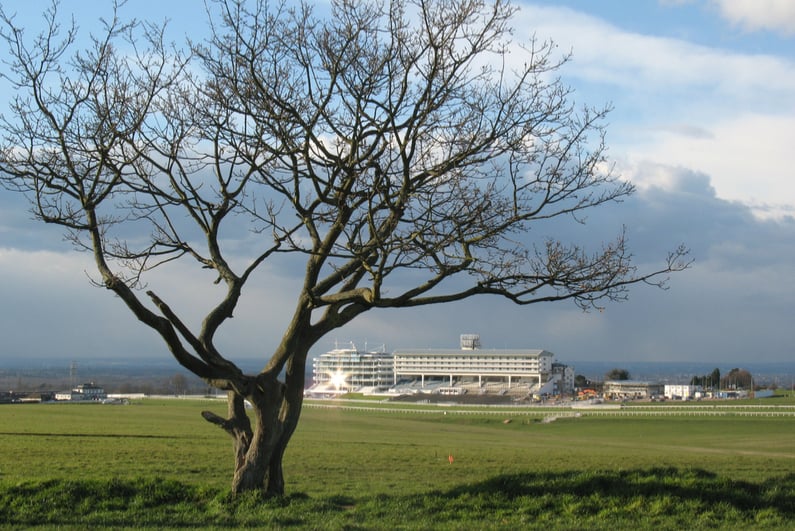The Melbourne Cup and the Kentucky Derby might disagree, but tomorrow sees the most famous flat race of them all – the Epsom Derby. (Note to readers in the US: It’s pronounced “darby”.)
First run in 1780, the race is over 1½ miles for three-year-old colts and fillies, and it’s the one race above all others that owners, jockeys, and trainers want to win. The Derby is the most famous of the five classics run during the British horseracing season and is traditionally referred to as the “Blue Riband” of the turf.
The course
Epsom is a racecourse in Surrey, about 18 miles south of London. Racing was first held on Epsom Downs in the 1660s. On Saturday, there will be a crowd of 130,000 to watch The Derby, many of them watching for free on the Downs. And they’ll be watching a race on a unique racecourse that could not be more different from the flat ovals of American tracks.
There is a steady climb through the first part of the race, before the horses drop down sharply towards Tattenham Corner, five furlongs (1,100 yards or roughly 1,000m) from the finish. Coming down the home straight, the natural camber of the course can make the horses unbalanced, before another climb up to the winning post in the last furlong. So, to win the Derby, a horse needs speed, stamina, balance, and – inevitably – luck. Plenty of horses that have gone on to have very successful careers have lost at Epsom, merely because they couldn’t perform well on the gradients of the course or they didn’t have the necessary luck in running.
The prize money
First prize this year is £850,000 ($1.13m). This pales into insignificance compared to the prize money for the Melbourne Cup at $3.6m, the Dubai World Cup, or the richest horse race in the world, the Pegasus World Cup, run at Gulfstream Park in Florida, which saw the owners of Gun Runner pocket $16.3m (£12.27m) for his two-length victory in January of this year.
The real prize money
Gun Runner has now retired from racing; he’s off to enjoy a well-deserved retirement and doing what successful thoroughbred racehorses are intended to do – make more thoroughbred racehorses. He’s retired to stud and will command a “fee’ of $70,000 per mare.
But compared to Galileo, Gun Runner is just a beginner. Galileo, winner of The Derby in 2001 and now approaching 20, commands a fee of €400,000 ($533,018) each time he performs. In the old days, a top stallion might cover 40 to 50 mares in a breeding season. Today that number is pushing up to – and can sometimes exceed – 100 covers. “You do the math,” as the saying goes. Tomorrow’s winner will end his days enjoying a lucrative career at stud, earning fees that will make the official prize money seem a drop in the ocean.
Is The Derby always won by a colt? “Yes” is the simple answer. The last filly to win the Derby was Fifinella in 1916. The last filly to even run in the Derby was Cape Verde, in 1998. She started as the favorite, but could only finish ninth.
So what about tomorrow?
The hot favorite for the race is Saxon Warrior, winner of the 2,000 Guineas and trained by possibly the most successful racehorse trainer the UK and Ireland have ever seen, Aidan O’ Brien. The most popular jockey in the race will unquestionably be Frankie Dettori, who is aboard the Aga Khan’s Hazapour. There are ten other runners in the race with Roaring Lion and Young Rascal also among the favorites. Any American punters at Epsom will be able to choose between Delano Roosevelt, currently available at around 14-to-1, and the ominously named The Pentagon, a 25-to-1 outsider.
The race is off at 4:30 UK time, and there will be plenty of anxious eyes turned towards the sky.
Why is the weather important?
Nothing determines whether a horse will win or lose a race, aside from its basic ability, more than the “going,” the condition of the racecourse itself. Some horses like “to hear their hooves rattle”: They have a galloping action that is suited to firm going. Others like “a bit of cut in the ground”; that is, ground that has been softened by rain. The forecast for parts of the UK over the next two days is little short of apocalyptical: thunderstorms and flooding. But it looks as if Epsom will miss the worst of the weather, which will be good news for Saxon Warrior. But if it rains hard, then the Derby will become an extreme test of stamina – and we could well be in for a shock result.
